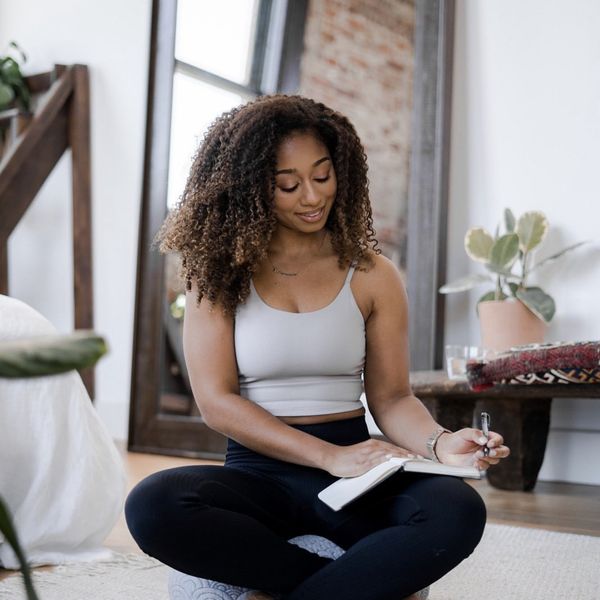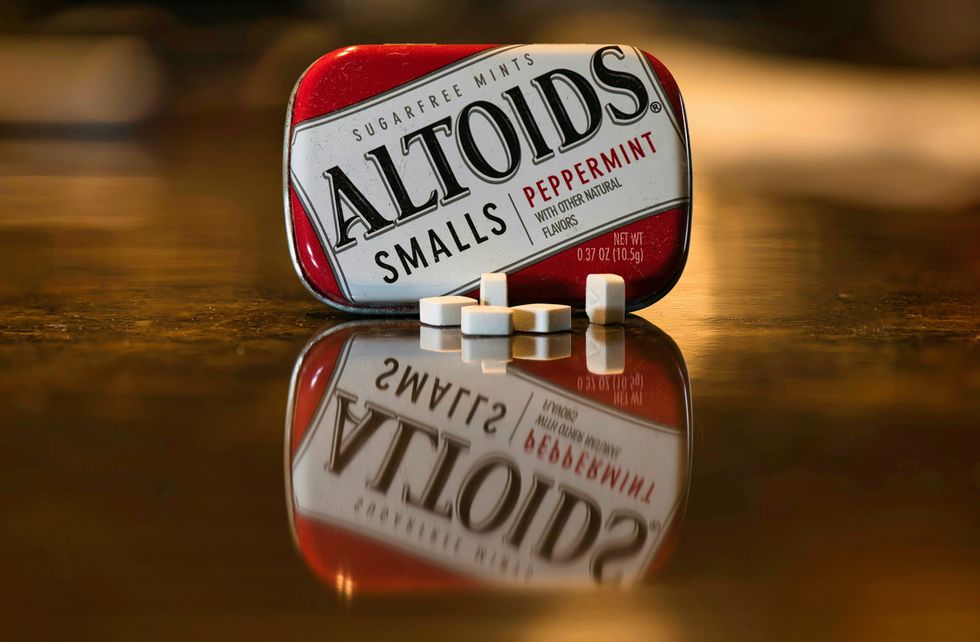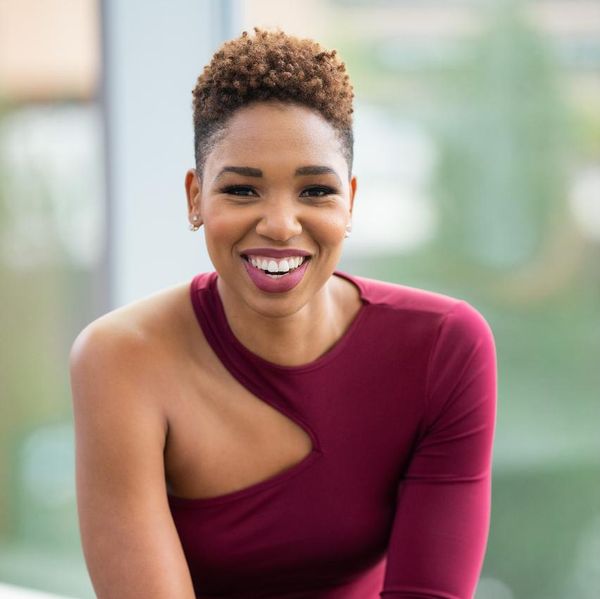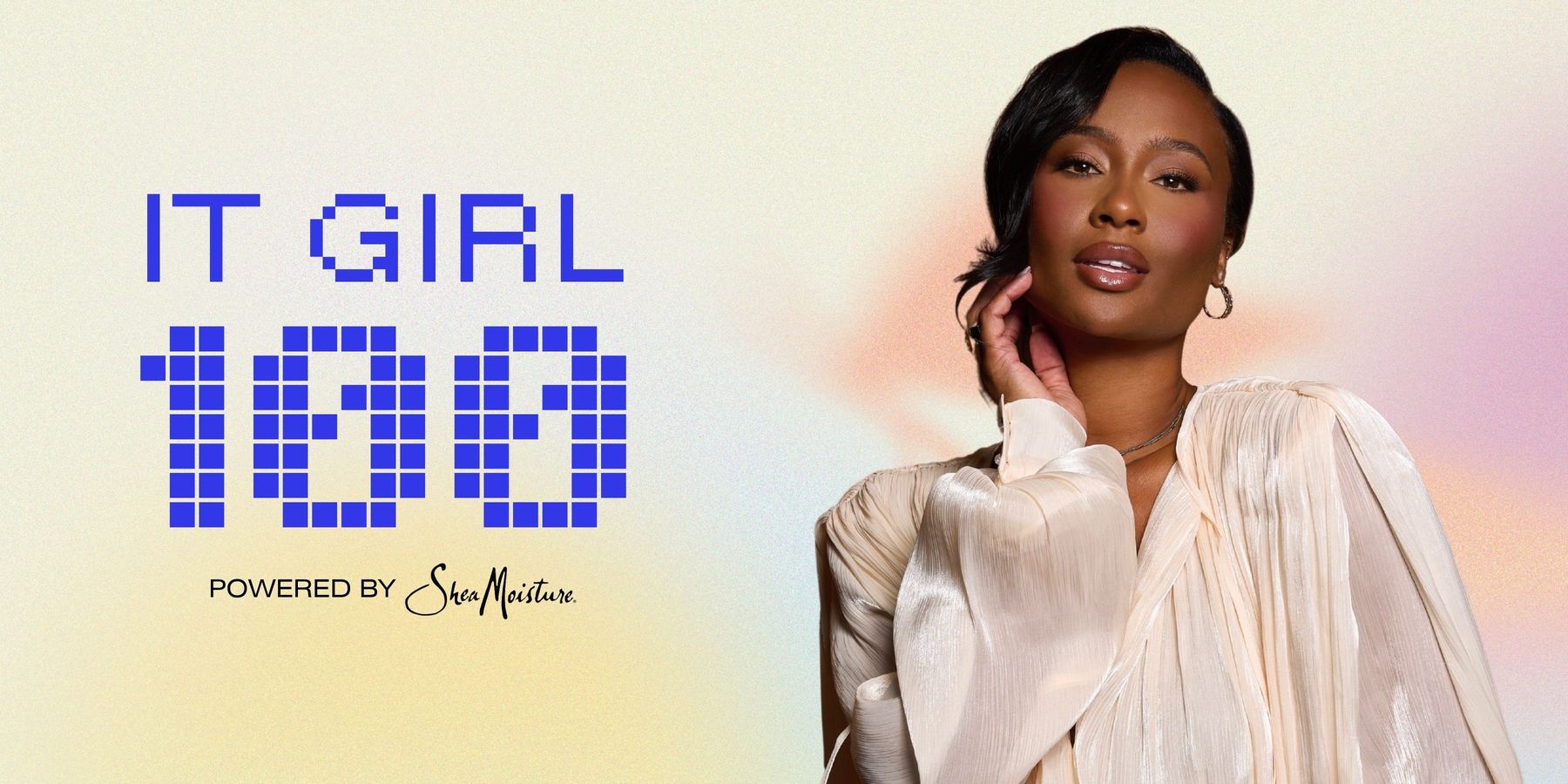'Balanced Black Girl' Host Les Alfred Shares How Embracing Change Transforms Your Life

In xoNecole's Finding Balance, we profile boss women making boss moves in the world and in their respective industries. We talk to them about their business, and most of all, what they do to find balance in their busy lives.
The Balanced Black Girl podcast is back for a new season, a new look, and a new network.
The content creator and host of the podcast, Les Alfred, had no idea when she launched the podcast that it would result in becoming a part of the Dear Media podcast family five years later; but the best success stories are the ones you had no idea were being written.
The 34-year-old described her career journey as one that isn't linear. Les started her career in corporate finance but, over time, realized that though working in corporate might have been paying the bills, it wasn't feeding her in ways she needed. The depletion and burnout she experienced inspired her to turn to exercise to support her mental health and boost her energy.
"That habit blossomed into a love of all things wellness," Les explained to xoNecole. "I became a personal trainer and nurtured a fitness career on the side, venturing into content creation in 2014."
Les would continue to pursue her content creation endeavors for four years in the form of a fitness blog. That fitness blog evolved into the launch of her podcast in 2018. The Seattle-based creator said the idea to expand her blog into a podcast sparked from her desire to cover broader conversations within the wellness niche. And thus, the Balanced Black Girl podcast was born.
The podcast touches on topics like wellness, healthy habits, rest, fitness, confidence, heartbreak, healing, and more and is sometimes structured as different "issues" similar to a magazine and what is expounded on in the podcast's wellness community and sister site, Balanced Black Girl. And what is a "Balanced Black Girl" exactly? "It's being a well-rounded, multi-faceted person who wants the best experiences life has to offer. So much of that starts with getting centered and focusing on habits that help us feel our best," Les shared.
Through the BBG journey, Les acts as a "wellness-y big sister" who is navigating similar life trials and seasons in a supportive way that makes her listeners who are going through similar things feel less alone with the help of community and someone who just gets it. With her work, Les guides others to their own expansion, healing, growth, and, of course, balance.
"I think I have had so many years in survival mode that they've blurred together. But being willing to make changes -- whether that was changing my environment, leaving relationships that weren't working, leaving jobs that weren't supporting my growth, etc., always helps build some momentum," she said of her journey to cultivating a life well-lived through optimal well-being.
In this installment of "Finding Balance," Les chats with xoNecole about the advice she'd give her younger self, making self-care a prerequisite in everything she does, and what balance looks like to the ultimate "Balanced Black Girl."
xoNecole: How has practicing self-care helped you become a better person?
Les Alfred: I don't think practicing self-care makes me a better person than I was before, however, I now have more patience and tools to help me be a better version of myself. I've learned how to communicate my needs, hold more space for others, and I've learned how to believe in myself.
xoN: What is the best advice you could give your younger self on how to navigate your 20s/30s?
LA: Stop putting pressure on yourself to figure everything out -- nobody ever has everything all figured out. Focus more on building the skills you need to have to build the life you want. Instead of focusing on finding the right relationship, focus on having healthy relationship skills. Learn how to manage your finances. Understand the ripple effect decisions you make in your 20s can impact you later on in life.
"Instead of focusing on finding the right relationship, focus on having healthy relationship skills. Understand the ripple effect decisions you make in your 20s can impact you later on in life."
xoN: At what point in your life did you understand the importance of pressing pause and finding balance in both your personal and professional life?
LA: I think I'm still learning that lesson! But in my late 20s, I had a bit of a reckoning with my personal life and career, when I realized what I had been doing just wasn't working for me. I wasn't having the social and professional experiences that I was seeking, and I had to learn how to assess what decisions I'd made until that point.
By pausing, getting curious, and being willing to do things differently, even if I didn't have immediate examples around me, I learned how to hold space for things being so much greater than I could imagine by releasing control.
xoN: What is a typical day in your life? If no day is quite the same, give me a rundown of a typical work week and what that might consist of.
LA: On a normal weekday, I wake up around 5:30 or 6 a.m. and do a quick meditation, then practice a little French. Then I'll throw on workout clothes, brush my teeth, and sip on warm lemon water or tea while doing a bit of reading. After that, I'm out the door going to my morning workout (usually either a class or a strength workout in the gym). After my workout, I get dressed for the day, have breakfast, make my to-do list, and get to work around 9 a.m.
I work [the] typical 9-5 hours and wrap up the work day around 5. Evenings totally vary -- I could be heading to an event, meeting up with friends, going on a date, or going for a long walk after work before having dinner at home and ending the night reading a book.
xoN: What are your mornings like?
LA: I'm a pretty early riser. I'm usually up by 6 and like to spend a bit of time reading, journaling, and getting in a morning workout. I've been doing these things for so long, this morning routine is like second nature to me by now.
After my workout, I get dressed for the day, whip up a smoothie for breakfast, and am usually ready to start the workday by about 9. I try to stay off my phone as much as possible.
xoN: How do you wind down at night?
LA: My wind-down routine usually involves a hot shower, doing my evening skincare, and reading (always fiction at night!) on my Kindle until I fall asleep.
xoN: When you have a busy week, what’s the most hectic part of it? What techniques or tools do you have in place to maintain your sense of self amid chaos?
LA: I tend to be time-optimistic in the sense that I have a habit of underestimating how much time things take (whether that's the time it takes to do a task, travel time to an event, etc.) so I have to be really mindful to not overbook myself. I also have to make it a point to build in downtime for myself.
I definitely don't feel my best if I don't have a bit of quiet time to recharge.
xoN: Do you practice any types of self-care? What does that look like for you?
LA: I try to infuse self-care into everything I do. Before starting a task, I like to get really clear on what I need to do and why -- that clarity to me is self-care. Spending time with my loved ones (and enforcing boundaries when needed) is self-care. I also consider my hobbies self-care. Earlier this year, I started taking tennis lessons not to be the next Serena [Williams] or Coco [Gauff] but to learn a new skill and to have an outlet that feels like play.
I also love buying flowers from the grocery store and making arrangements. Reading fiction and getting lost in a story is a huge form of self-care for me. And, of course, the standard practices like exercise, meditation, and journaling -- we talk about them so much because they work.
xoN: Oftentimes, when we hear talk about love languages, it is how we give love to others. What is your self-love language and how do you give that to yourself?
LA: This year, I learned my love language is quality time. I really like having rich experiences and creating memories, so I'm always looking for ways to do that. Whether it's through travel or intentional time with friends and family, I'm always looking to create a positive, memorable experience.
xoN: When you are going through a bout of uncertainty, or feeling stuck, how do you handle it?
LA: I embrace change because, in those scenarios, things can't get better without it. Even making the smallest change can provide much-needed momentum. Whether it's trying a new workout, taking a new route to work, changing up daily walks, or listening to new music, embracing small changes helps us see new perspectives and prepares us for the bigger changes that help take us to the next level.
"I embrace change because, in those scenarios, things can't get better without it. Even making the smallest change can provide much-needed momentum."
xoN: Lastly, how do you define "balance" in your life?
LA: Balance to me doesn't mean doing it all or packing my plate until it's full to the brim. It means being a whole, well-rounded person who is able to hold space for the various experiences life brings us.
For more of Les, check out Balanced Black Girl and its new season here. Follow Les on Instagram @balancedles.
Let’s make things inbox official! Sign up for the xoNecole newsletter for daily love, wellness, career, and exclusive content delivered straight to your inbox.
Featured image by Kaye McCoy
Exclusive: Viral It Girl Kayla Nicole Is Reclaiming The Mic—And The Narrative
It’s nice to have a podcast when you’re constantly trending online. One week after setting timelines ablaze on Halloween, Kayla Nicole released an episode of her Dear Media pop culture podcast, The Pre-Game, where she took listeners behind the scenes of her viral costume.
The 34-year-old had been torn between dressing up as Beyoncé or Toni Braxton, she says in the episode. She couldn’t decide which version of Bey she’d be, though. Two days before the holiday, she locked in her choice, filming a short recreation of Braxton’s “He Wasn’t Man Enough for Me” music video that has since garnered nearly 6.5M views on TikTok.
Kayla Nicole says she wore a dress that was once worn by Braxton herself for the Halloween costume. “It’s not a secret Toni is more on the petite side. I’m obsessed with all 5’2” of her,” she tells xoNecole via email. “But I’m 5’10'' and not missing any meals, honey, so to my surprise, when I got the dress and it actually fit, I knew it was destiny.”
The episode was the perfect way for the multihyphenate to take control of her own narrative. By addressing the viral moment on her own platform, she was able to stir the conversation and keep the focus on her adoration for Braxton, an artist she says she grew up listening to and who still makes her most-played playlist every year. Elsewhere, she likely would’ve received questions about whether or not the costume was a subliminal aimed at her ex-boyfriend and his pop star fiancée. “I think that people will try to project their own narratives, right?” she said, hinting at this in the episode. “But, for me personally – I think it’s very important to say this in this moment – I’m not in the business of tearing other women down. I’m in the business of celebrating them.”
Kayla Nicole is among xoNecole’s It Girl 100 Class of 2025, powered by SheaMoisture, recognized in the Viral Voices category for her work in media and the trends she sets on our timelines, all while prioritizing her own mental and physical health. As she puts it: “Yes, I’m curating conversations on my podcast The Pre-Game, and cultivating community with my wellness brand Tribe Therepē.”
Despite being the frequent topic of conversation online, Kayla Nicole says she’s learning to take advantage of her growing social media platform without becoming consumed by it. “I refuse to let the internet consume me. It’s supposed to be a resource and tool for connection, so if it becomes anything beyond that I will log out,” she says.
On The Pre-Game, which launched earlier this year, she has positioned herself as listeners “homegirl.” “There’s definitely a delicate dance between being genuine and oversharing, and I’ve had to learn that the hard way. Now I share from a place of reflection, not reaction,” she says. “If it can help someone feel seen or less alone, I’ll talk about it within reason. But I’ve certainly learned to protect parts of my life that I cherish most. I share what serves connection but doesn’t cost me peace.
"I refuse to let the internet consume me. It’s supposed to be a resource and tool for connection, so if it becomes anything beyond that I will log out."

Credit: Malcolm Roberson
Throughout each episode, she sips a cocktail and addresses trending topics (even when they involve herself). It’s a platform the Pepperdine University alumnus has been preparing to have since she graduated with a degree in broadcast journalism, with a concentration in political science.
“I just knew I was going to end up on a local news network at the head anchor table, breaking high speed chases, and tossing it to the weather girl,” she says. Instead, she ended up working as an assistant at TMZ before covering sports as a freelance reporter. (She’s said she didn’t work for ESPN, despite previous reports saying otherwise.) The Pre-Game combines her love for pop culture and sports in a way that once felt inaccessible to her in traditional media.
She’s not just a podcaster, though. When she’s not behind the mic, taking acting classes or making her New York Fashion Week debut, Kayla Nicole is also busy elevating her wellness brand Tribe Therepē, where she shares her workouts and the workout equipment that helps her look chic while staying fit. She says the brand will add apparel to its line up in early 2026.
“Tribe Therepē has evolved into exactly what I have always envisioned. A community of women who care about being fit not just for the aesthetic, but for their mental and emotional well-being too. It’s grounded. It’s feminine. It’s strong,” she says. “And honestly, it's a reflection of where I am in my life right now. I feel so damn good - mentally, emotionally, and physically. And I am grateful to be in a space where I can pour that love and light back into the community that continues to pour into me.”
Tap into the full It Girl 100 Class of 2025 and meet all the women changing game this year and beyond. See the full list here.
Featured image by Malcolm Roberson
If there is one thing that I am going to do, it’s buy myself some scented soy candles. And, as I was looking at a display of them in a TJ Maxx store a couple of weekends ago, I found myself wondering just who decided which scents were considered to be “holiday” ones. The origin stories are actually pretty layered, so, for now, I’ll just share a few of ‘em.
I’m sure it’s pretty obvious that pine comes from the smell of fresh Christmas trees; however, scents like cloves, oranges, and cinnamon are attributed to two things: being natural ways to get well during the cold and flu season, and also being flavors that are used in many traditional holiday meals.
Meanwhile, frankincense and myrrh originate from the Middle East and Africa (you know, like the Bible does — some folks need to be reminded of that—eh hem — Trumpers) and ginger? It too helps with indigestion (which can definitely creep up at Thanksgiving and Christmas dinner tables); plus, it’s a key ingredient for ginger snaps and gingerbread houses. So, as you can see, holiday-themed scents have a rhyme and reason to them.
Tying this all in together — several years ago, I penned an article for the platform entitled, “Are You Ready To Have Some Very Merry ‘Christmas Sex’?” Well, in the spirit of revisiting some of that content, with a bit of a twist, I decided to broach some traditional holiday scents from the perspective of which ones will do your libido a ton of good from now through New Year’s Eve (check out “Make This Your Best NYE. For Sex. EVER.”).
Are you ready to check some of them out, so that, whether it’s via a candle, a diffuser, some essential oil, or some DIY body cream (check out “How To Incorporate All Five Senses To Have The Best Sex Ever”), you can bring some extra festive ambiance into your own boudoir? Excellent.
1. Vanilla

Unsplash
When it comes to holiday desserts, you’re going to be hard-pressed to find recipes that don’t include vanilla — and that alone explains why it is considered to be a traditional holiday scent. As far as your libido goes, vanilla is absolutely considered to be an aphrodisiac — partly because its sweet scent is considered to be very sensual. Some studies even reveal that vanillin (the active ingredient in vanilla) is able to increase sexual arousal and improve erectile dysfunction in men. So, if you adore the smell, here is more incentive to use it.
2. Frankincense

Unsplash
Although, typically, when people think about frankincense (and myrrh), it’s in the context of the gifts that the wise men brought Christ after he was born; it’s a part of the biblical Christmas story. However, frankincense goes much deeper than that. Sexually, since it has an earthy and spicy scent, some people like to use it to meditate (check out “What Exactly Is 'Orgasmic Meditation'?”). Also, since it has the ability to put you in a better mood, soothe and soften your skin and maintain your oral health — with the help of frankincense, every touch and kiss can be that much…sexier.
3. Cinnamon

Unsplash
I already gave cinnamon a shout-out in the intro. Personally, I’ve been a fan of it, in the sex department, for a long time now (check out “12 ‘Sex Condiments’ That Can Make Coitus Even More...Delicious”). When it’s in oil form, it can be very sweet to the taste while sending a warm sensation throughout the body — which is why the giver and receiver of oral sex can benefit from its usage. Beyond that, cinnamon helps to increase blood flow to your genital region, elevate sexual desire and, some studies say that it can even help improve fertility. Beautiful.
4. Peppermint

Unsplash
If there’s a signature candy for the holiday season, it’s probably a candy cane — which automatically puts peppermint in the running for being an official holiday scent. Pretty much, in any form, it’s got your sex life’s back because it’s hailed as being a sexual stimulant; in part, because its smell is so invigorating. Plus, it helps to (eh hem) ease headaches, it gives you more energy and it can definitely help to freshen your breath. Also, that minty sensation? The same thing that I said about cinnamon can apply to peppermint too (if you catch my drift).
5. Ginger

Unsplash
Whether it’s in a meal or in your bedroom, ginger is going to produce results that are hella spicy. On the sex tip, science has praised ginger for being able to increase sexual arousal, improve blood circulation (which intensifies orgasms) and strengthen fertility for many years. Scent-wise, I find it to be one that both men and women enjoy because it is both woodsy and sweet. So, if you’ve got some massage oil in mind, adding some ginger is a way to please you both.
6. Pomegranate

Unsplash
September through December is the time of year when pomegranates are considered to be in season. And, as someone who is a Rosh Hashanah observer, I have a personal adoration for them because I am aware of the various things that they symbolize in Hebrew culture including the fact that they are a fruit that represents love and fertility. So yeah, they would absolutely be an aphrodisiac — one that is perfect for this time of the year. While consuming it helps to boost testosterone levels in both men and women, the floral bittersweet smell that it produces can help to reduce stress while promoting relaxation (like most floral scents do) — and the more relaxed you are, the easier it is to climax.
7. Nutmeg

Unsplash
Another signature seasoning during the holiday season is nutmeg. It’s perfect in Thanksgiving sweet potato (or pumpkin) pie and Christmas morning French toast. And yes, it can also make your sex life better. If you consume it, it can intensify your libido and, overall, its warm-meets-spicy-meets-sweet smell is so inviting that it is considered to be a pretty seductive scent.
8. Cloves

Unsplash
I ain’t got not one lie to tell you — if you’ve got a toothache, put some clove oil on that bad boy and send me a Christmas present for putting you on game. Aside from that, as I round all of this out, cloves are another holiday scent that can do wonders for your sex life. For men, it has the ability to significantly increase sexual arousal and improve stamina and endurance. For men and women alike, it also has a reputation for strengthening sexual desire. And for women solely? Well, if you want an all-natural way to increase natural lubrication down below — the scent and and feel (in DILUTED oil form) can make that happen. It can make the holidays especially special…if you know what I mean.
Ah yes — the atmosphere of the holidays and what it can do.
Take it all in! Scent ‘n whatever stimulating that comes with it! #wink
Let’s make things inbox official! Sign up for the xoNecole newsletter for love, wellness, career, and exclusive content delivered straight to your inbox.
Featured image by Giphy









